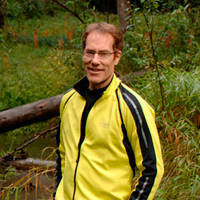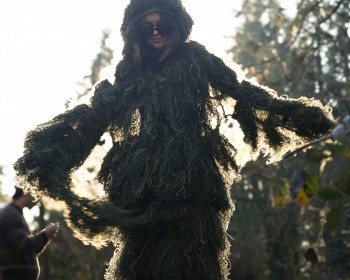New Course Examines Intersection of Sustainability and Entrepreneurship
by Amelia Eichel BA ’20
Working with Lewis & Clark’s Sustainability Council, the Bates Center for Entrepreneurship and Leadership is offering a class in sustainability and entreprepreneurship this fall. Taught by Lewis & Clark Law Professor Dan Rohlf, it is open to all majors and focuses on current trends to address environmental, economic, and social disparities of the 21st century.
“Sustainability is one of our core themes and has been identified as a growth area in the new strategic plan,” Sustainability Director Amy Dvorak said. “One key focus of that growth is having more academic offerings around sustainability.”
So far, Rohlf has brought in six guest speakers, giving students an opportunity to engage with professionals involved in the sustainability work that they are learning about. Rohlf has modeled the overall syllabus on issues discussed in his sustainability course at the law school but with a stronger focus on entrepreneurship.

On October 18 the class welcomed Nicole Bassett, the co-founder of The Renewal Workshop, a business that repairs, cleans, and organizes apparel from local clothing businesses that would otherwise throw the garments away. Bassett’s company and other businesses like it focus on sustainability in all aspects, including working conditions and fair compensation for workers.
“Sustainability is so all-encompassing,” Terra Clarke BA ’20, a rhetoric and media studies major from Arcata, California, said. “You have to think about not only what you’re doing to help the planet, but how you’re treating your workers. There are so many different aspects of sustainability that you have to think about when you do it. Some companies are really good at doing one, some companies are better at doing another.”
In class recently, students presented on a project for which they used an online tool called the Real Food Calculator, a tool to track college and universities’ food purchasing.
“The Real Food Calculator tries to get colleges and their sustainability managers and students to think about where their food is coming from and the food system and how that impacts the environment and the people who live around that area,” said Mamelang Memela BA ’20, a double major in environmental studies and French studies.
Memela, a Davis United World College Scholar whose hometown is Johannesburg, South Africa, says the class has inspired her to think about sustainability’s role in her life after college.
“One of the reasons I like this class is it’s very practical,” Memela explained. “It takes all of these theories you’ve learned, and the ones that I’ve learned to make my major, and applies them to the real world. I’m able to bridge that gap and see how these abstract theories come to manifest in real life. And also it’s made me think about the things I’d like to do after being here. Going into sustainability and being a sustainability manager is something that I’m interested in. I’d like to work with businesses and help them see how we can make them more efficient as well as beneficial to people and the environment.”
Bates Center for Entrepreneurship and Leadership
Sustainability
Environmental, Natural Resource, and Energy Law
More Newsroom Stories
Public Relations is located in McAfee on the Undergraduate Campus.
MSC: 19
email public@lclark.edu
voice 503-768-7970
Public Relations
Lewis & Clark
615 S. Palatine Hill Road MSC 19
Portland OR 97219

